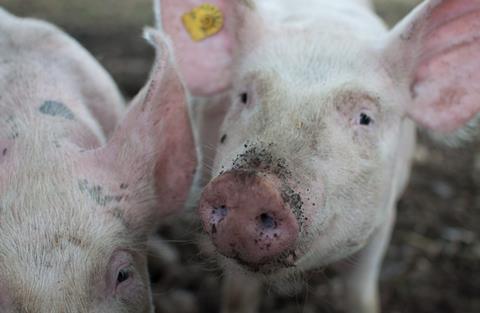The first follow-up meeting to the pig industry crisis summit held in February was attended by representatives from the sector with the aim of assessing the backlog situation and processors’ plans to reduce it.

The meeting was attended by the National Pig Association (NPA), National Farmers’ Union (NFU), several pork processors, the British Meat Processors Association (BMPA) and the Association of Independent Meat Suppliers (AIMS). It was chaired by Farming Minister Victoria Prentis.
NPA chief executive Zoe Davies said: “The Minister fully understands the problems pig farmers are living with and the scale of this crisis and she has listened to what we are saying needs to happen.”
SIPS changes
The discussion covered the impact of recent changes to the Slaughter Incentive Payment Scheme (SIPS). The NPA has requested an extension of the scheme, which is currently due to close at the end of March.
Davies said: “Allowing pork from SIPS kills to be sold on the domestic market has made it more attractive to processors and we are starting to see more of these additional shifts take place. This is the only measure so far that has had any impact on reducing the backlog, but, given the sheer numbers of pigs to get through, we need it to continue beyond March.”
Backlog plans and retail support
NPA said that, prior to the meeting, Prentis had questioned processors individually on their plans for reducing the backlog, including asking about additional shifts, number of extra pigs killed and planned for and how they prioritise within their own supply chains. The NPA said it will be providing information to the Minister to help “ensure pigs are prioritised from farms that need it most.”
Prentis also has plans to meet retailers individually from next week, as well as hospitality and wholesale businesses that buy pork. She asked for specific information on unclear labelling and buying practises and NPA said that it will be providing a briefing.
In addition, the Minister has also met with agricultural leads of banks, who she said had assured her assured they were being “flexible” when it comes to struggling pig businesses. She asked those present to report back if issues were being seen on the ground, however.
A discussion with the Home Office has also been carried out by the Minister, with further meetings being organised with processors and the NPA to discuss visas in the coming weeks.
Compensation calls
NFU president Minette Batters once again argued for financial support from government for producers. She said: "Whilst Defra is still resolutely sticking to their position that their support has been targeted at processors to ease the backlog, with the growing issues surrounding input prices as a result of the Ukraine Russia war, we believe there is now a far stronger case to argue for exceptional market conditions and secure a case for compensation."
Enormous and unwelcome pressure
Nick Allen, British Meat Processors Association (BMPA), said: “It was clear from the meeting that progress into the backlog of pigs is being made but there is quite a way to go yet. If an extension to the SIPS scheme is forthcoming it will help to keep the momentum going. Many of the processors are working extra-long hours to try and help, but there are only so many hours that staff can be asked to work.
“The problems that the Ukraine situation will cause in relation to feed prices was very much at the forefront of people’s minds at the meeting and there is no doubt the situation is going to put enormous and unwelcome pressure on food supply chains for the foreseeable future with very serious ramifications.”
He added: “We wait to see what the outcomes are from the minister’s meeting with the retailers, but it is important that any changes at retail are done in consultation with the processors as it would be easy to upset the carcase balance and make things worse, not better, in the current climate.”
“Whilst progress is being made with increased slaughterings there are still many overweight pigs in the system that continue to cause issues at farm level and in the processing plants, and it is unfortunate that as yet a solution to removing these from the system has not been found,” he said.
“Access to China was also discussed at the meeting for the UK plants that have been delisted, particularly in light of the progress that France has made on this front recently.”
This story was originally published on a previous version of the Meat Management website and so there may be some missing images and formatting issues.












